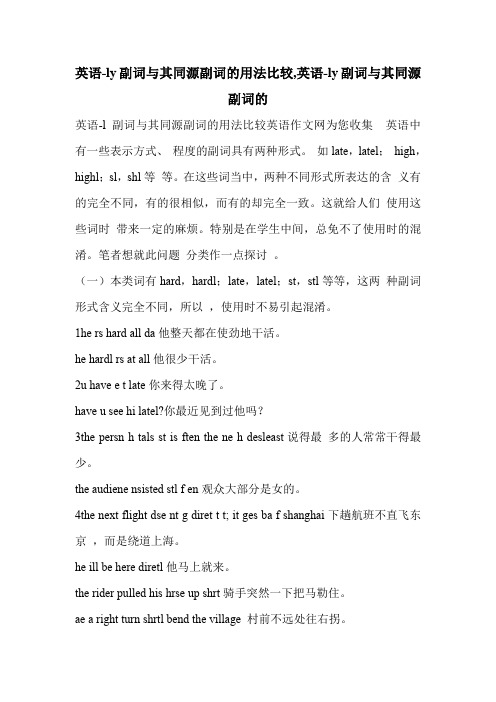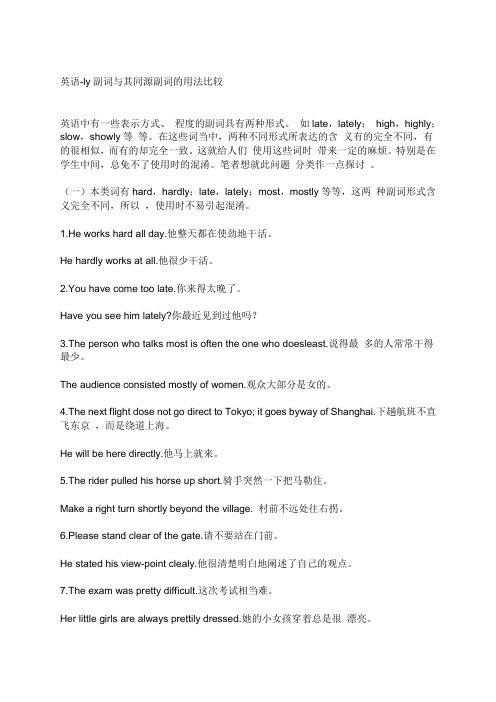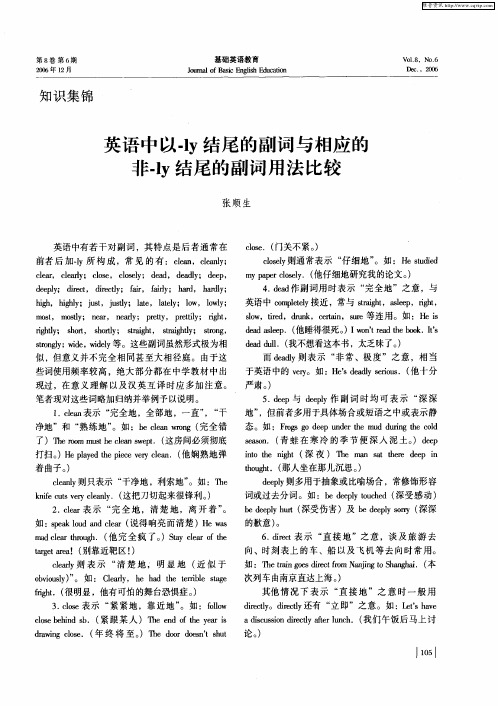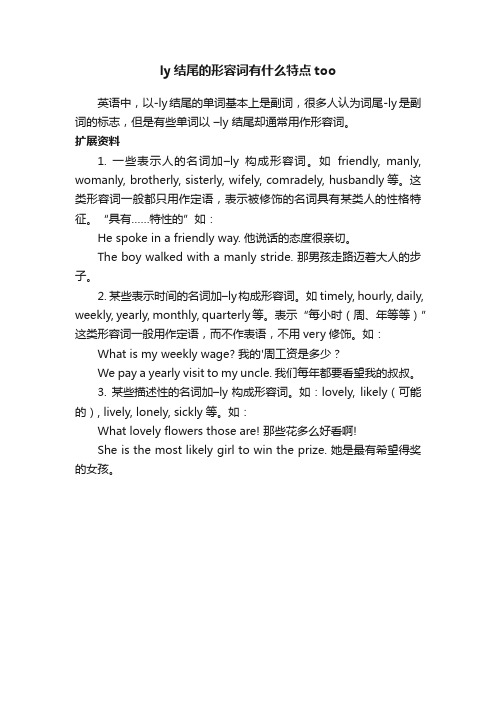形近副词带-ly与不带-ly
浅议以-ly结尾的副词与其同源副词的异同

浅议以-ly结尾的副词与其同源副词的异同英语中有一些表示方式、程度的副词具有两种形式,如late, lately; high, highly; slow, slowly等。
在这些词当中,两种形式所表达的含义有的完全不同,有的很相似,而有的却完全一致,这就给人们使用这些词带来一定的麻烦,特别是在学生中间,使用时极易引起混淆。
一、两种形式副词含义完全不同这类词有hard / hardly, late / lately, most / mostly等,由于两者间含义完全不同,使用时不易引起混淆。
例如:1. hard / hardlyShe makes money hard all day. 她整天努力挣钱。
He hardly makes money at all. 他几乎挣不到钱。
2. late / latelyYou have left too late. 你离开得太晚了。
I have never seen her lately. 我最近从没见过她。
3. most / mostlyTom runs most fast in our class. 汤姆在我们班跑得最快。
The audience consisted mostly of children. 观众大部分是孩子。
二、两种形式副词含义类似这类词主要有wide / widely, close / closely, high / highly等。
这两种副词形式不同,含义也有差别,但是没有第一类区别明显,翻译成汉语时用词也很接近,所以使用时很容易混淆。
这类词含义及用法上的主要特点是:不带-ly的副词表示具体的行为和动作,说明的动作或状况有可测量性和可见性;而以-ly结尾的同源副词所表达的常常是抽象性的行为和状况。
这时,这些词大都具有“greatly”和“extremely”的含义。
试作如下比较:1. high / highlyPlanes can fly high above the area. 飞机可以在很高的上空飞。
英语-ly副词与其同源副词的用法比较,英语-ly副词与其同源副词的

英语-ly副词与其同源副词的用法比较,英语-ly副词与其同源副词的英语-l副词与其同源副词的用法比较英语作文网为您收集英语中有一些表示方式、程度的副词具有两种形式。
如late,latel;high,highl;sl,shl等等。
在这些词当中,两种不同形式所表达的含义有的完全不同,有的很相似,而有的却完全一致。
这就给人们使用这些词时带来一定的麻烦。
特别是在学生中间,总免不了使用时的混淆。
笔者想就此问题分类作一点探讨。
(一)本类词有hard,hardl;late,latel;st,stl等等,这两种副词形式含义完全不同,所以,使用时不易引起混淆。
1he rs hard all da他整天都在使劲地干活。
he hardl rs at all他很少干活。
2u have e t late你来得太晚了。
have u see hi latel?你最近见到过他吗?3the persn h tals st is ften the ne h desleast说得最多的人常常干得最少。
the audiene nsisted stl f en观众大部分是女的。
4the next flight dse nt g diret t t; it ges ba f shanghai下趟航班不直飞东京,而是绕道上海。
he ill be here diretl他马上就来。
the rider pulled his hrse up shrt骑手突然一下把马勒住。
ae a right turn shrtl bend the village 村前不远处往右拐。
6please stand lear f the gate请不要站在门前。
he stated his vie-pint leal他很清楚明白地阐述了自己的观点。
7the exa as prett diffiult这次考试相当难。
her little girls are alas prettil dressed她的小女孩穿着总是很漂亮。
最新以-ly结尾的形容词和副词

谈谈以-ly结尾的形容词和副词II.以-ly 结尾的形容词:elderly 年老的an elderly person friendly 友好的 a friendly ladyunlikely 不可能的He's unlikely to come. holy 神圣的 a holy placelively 活泼的,愉快的;热烈的a lively debate lonely 孤独的 a lonely personsilly 愚蠢的;糊涂的 a silly act ugly 丑的,难看的an ugly painting costly昂贵的;代价高的a costly mistake lovely 可爱的 a lovely catcurly 卷的curly hair deadly 致命的,毒性的 a deadly weapon unfriendly 不友好的,有敌意an unfriendly person bodily 肉体的,身体的; severe bodily injury cowardly 胆小的;懦弱的a cowardly act disorderly 混乱的, disorderly conduct/room heavenly天国的,神圣的; a heavenly vision hilly 多山丘的;丘陵的a hilly city homely 家庭的;不做作的a homely woman manly 有男子气概的 a manly voice quarterly 按季度,一季一次地a quarterly report scholarly学者风度的a scholarly look smelly 难闻的smelly socksIII以-ly结尾的副词:slowly 慢慢地carelessly 粗心地carefully 仔细地quickly 快地manly 男人地warmly 热地coldly 冷地hardly 几乎不quietly 安静地totally 全部地angrily 生气地deadly 要命地ugly 丑地actively 积极地politely 礼貌地wisely 聪明地fully 充分地,彻底地gladly 高兴地possibly 可能地truly 真实地energetically 精力充沛automatically自动地一、刑法的基本原则(一)罪刑法定原则,指什么行为是犯罪和对这种行为处以何种刑罚,必须预先由法律明文规定的原则。
以-ly结尾的常见形容词

以-ly结尾的常见形容词有些以-ly结尾的词通常不是副词,而是形容词,如costly, cowardly, lovely, lonely, lively, friendly, unfriendly, silly, ugly, womanly, motherly, fatherly, brotherly, sisterly, elderly等,这类形容词大多是用来描述人的品质的。
如:She smiled in a friendly way. 她友好地微微一笑。
Spring is a lovely season. 春天是可爱的季节。
I’m surprised that he should feel lonely.我很惊讶他竟感到孤独。
One-tenth of the population are elderly people. 十分之一的人口是老年人。
有些-ly结尾的既可形容词也是副词,如daily, weekly, monthly, quarterly, yearly, likely, early等既可也可用作形容词。
如:I hope to catch an early train. I want to arrive early. 我希望赶上早班火车,我想早到。
I receive weekly bills. I pay my bills weekly. 我收到的是周账单,我是按周付清账单的。
1. brotherlyThe older boy gave the newcomer some brotherly advice. 那个年龄大一点的男孩给新来的孩子一些亲兄弟似的忠告。
Brotherly love is based on the experience that we all are one. 手足情爱建立在我们大家心连心、团结如一人这种经历的基础上。
2. costlyIt would be too costly to repair the car. 修理这辆汽车要花很多钱。
英语-ly副词与其同源副词的用法比较 high highly close closely deep deeply wide widely

英语-ly副词与其同源副词的用法比较英语中有一些表示方式、程度的副词具有两种形式。
如late,lately;high,highly;slow,showly等等。
在这些词当中,两种不同形式所表达的含义有的完全不同,有的很相似,而有的却完全一致。
这就给人们使用这些词时带来一定的麻烦。
特别是在学生中间,总免不了使用时的混淆。
笔者想就此问题分类作一点探讨。
(一)本类词有hard,hardly;late,lately;most,mostly等等,这两种副词形式含义完全不同,所以,使用时不易引起混淆。
1.He works hard all day.他整天都在使劲地干活。
He hardly works at all.他很少干活。
2.You have come too late.你来得太晚了。
Have you see him lately?你最近见到过他吗?3.The person who talks most is often the one who doesleast.说得最多的人常常干得最少。
The audience consisted mostly of women.观众大部分是女的。
4.The next flight dose not go direct to Tokyo; it goes byway of Shanghai.下趟航班不直飞东京,而是绕道上海。
He will be here directly.他马上就来。
5.The rider pulled his horse up short.骑手突然一下把马勒住。
Make a right turn shortly beyond the village. 村前不远处往右拐。
6.Please stand clear of the gate.请不要站在门前。
He stated his view-point clealy.他很清楚明白地阐述了自己的观点。
7.The exam was pretty difficult.这次考试相当难。
形容词变副词的规则

形容词变副词的规则:【1】一、在形容词词尾直接加-ly。
如:real-really; helpful-helpfully; careful-carefully; hopeful-hopefully; slow-slowly; quick-quickly; quiet-quietly polite-politely, wide-widely二、以辅音字母加y结尾的形容词要变y为i,然后再加-ly。
如:busy-busily; angry-angrily;easy-easily happy-happily heavy-heavilynoisy----noisily ;healthy----healthilynaughty, pretty ,thirsty ,lazy,三、以-ue结尾的形容词要先去掉e,然后再加-y:如:true-truly;四、以le 结尾的形容词,去e 加y 变成副词:terrible-terribly;; gentle-gentlypossible-possiblyprobable—probably; responsible—responsibly ; comfortable----comfortablygentle----gentlysimple----simplycapable有能力的simple简单的gentle温柔enjoyable 快乐的fashionable 时髦的enjoyable 快乐的comfortable 舒服的,舒适的lovable 可爱的washable 可洗的,耐洗的suitable 适当的,相配的lovable 可爱的suitable 适当的,相配的五、另外,副词还可以由形容词加前缀a-得来,如:loud (adj.)-aloud (adv.)注意:1.多音节y结尾的词将y改为i后加lyeasy-easily happy-happily heavy-heavily2.单音节y结尾的词直接加lygay-gayly (gaily) ;sly-slyly (slily)3.以ll结尾的词只加y full-fully4.以ic结尾的词加allyautomatic-automatically ;energetic-energetically5.其他形容词均加lycareful-carefully ;glad-gladly6.本身既是形容词也是副词,无需改变fast----fastearly----earlyhigh----highhard----hardlate----latefar----farwide----widealone----alone、7.虽然以ly结尾,但却是形容词,不能直接用来修饰动词friendlylivelylovelylonelylikely8.有些形容词本身即为副词,同时也有加ly的副词形式。
英语中以-ly结尾的副词与相应的非-ly结尾的副词用法比较

I h i l;js ut ;le a l;l ,l l; l ,hg y ut sy a ,le i g h ,j l t ty o o y w w
mot m s y n a , n al s, o t ; e l r e y; pet p et y r h , r rt y, rtl ; i t i g
il r t ; so , s ry sa t sa t ; s n , h g y hr h t ; t i , ti l t ol rg h rg y t g h o r
sog ; i , dl等。这些 副词虽 然形式极 为相 tnl w e w e r y d i y 似 ,但意义并 不完全 相 同甚至 大相径 庭 。由于这
些词使用频率较高,绝大部分都在中学教材 中出 现过 ,在意 义理 解 以及汉 英 互译 时应 多 加 注意 。
笔者现对这些词略加归纳并举 例予以说 明。 1 c a 表示 “ .l n e 完全地 ,全部 地 ,一 直” 于 ,“ 净地”和 “ 熟练 地” 。如 :b l rn 完全 错 ec a wog( e n 了)Teomm sb en wp.( h o ut ca et 这房间必须彻底 r l s e 打扫。 ep ydt i e e e .( )H l e ep c rc a 他娴熟地 弹 a h e v yl n
ov ul) o 如 :Cer ,h a h e i e sg bi s ” o y l l e hd t t r l t e ay e rb a
6 det 示 “ 接 地 ”之 意 ,谈 及旅 游 去 .r 表 i c 直 向、时刻 表 上 的车 、船 以及 飞 机 等去 向时 常 用。 如 :Tern os icfmN jgtSaga.( h a edetr a i n i 本 tig r o n n o h h 次列车 由南京直达上海 。 ) 其他 情 况 下 表 示 “ 接 地 ”之 意 时 一 般 用 直 d cy iet 还有 “ 即”之 意 。如 :Lt ae i t。d cy e r l rl 立 e’hv S
ly结尾的形容词有什么特点too

ly结尾的形容词有什么特点too
英语中,以-ly结尾的单词基本上是副词,很多人认为词尾-ly是副词的标志,但是有些单词以–ly 结尾却通常用作形容词。
扩展资料
1. 一些表示人的名词加–ly构成形容词。
如friendly, manly, womanly, brotherly, sisterly, wifely, comradely, husbandly等。
这类形容词一般都只用作定语,表示被修饰的名词具有某类人的性格特征。
“具有……特性的”如:
He spoke in a friendly way. 他说话的态度很亲切。
The boy walked with a manly stride. 那男孩走路迈着大人的步子。
2. 某些表示时间的名词加–ly构成形容词。
如 timely, hourly, daily, weekly, yearly, monthly, quarterly等。
表示“每小时(周、年等等)”这类形容词一般用作定语,而不作表语,不用very修饰。
如:What is my weekly wage? 我的'周工资是多少?
We pay a yearly visit to my uncle. 我们每年都要看望我的叔叔。
3. 某些描述性的名词加–ly构成形容词。
如:lovely, likely(可能的), lively, lonely, sickly等。
如:
What lovely flowers those are! 那些花多么好看啊!
She is the most likely girl to win the prize. 她是最有希望得奖的女孩。
- 1、下载文档前请自行甄别文档内容的完整性,平台不提供额外的编辑、内容补充、找答案等附加服务。
- 2、"仅部分预览"的文档,不可在线预览部分如存在完整性等问题,可反馈申请退款(可完整预览的文档不适用该条件!)。
- 3、如文档侵犯您的权益,请联系客服反馈,我们会尽快为您处理(人工客服工作时间:9:00-18:30)。
形容词:英语中大多数带-ly 的都为副词,但以下带-ly的却 是 friendly, deadly, lovely , lonely, likely, lively, ugly, brotherly. 下带-ly的既可作形容词已可作副词:daily,weekly, monthly,yearly,early The Times is a daily paper. The Times is published dail y. 一些表示方式、 程度的副词具有两种形式。 如late, lately; slow,slowly;hard, hardly等。在这些词中,两种 不同形式所表达的含义有的完全不同,而有的很相似。中学 生在使用中常常混淆。
一.有的意思wer/more slowly. Hold it tight/tightly. Mary is running quickly but John is running even quicker.
二.有的意思完全不同。学习时多加 注意。如:
四.还有一类含义也较接近,其区别 是:
带-ly的表示动作的方式方法,而不带-ly的则表示一 种状态或行动后的感觉。如: “Please speak louder(感觉).” the teacher called him loudly(方式). He stood close(状态)because the words on the board were written closely(方式). The driver said slowly(方式): “I always drive slow(感觉).” The photo didn’t come out clear (感觉)but he remembered it clearly(方式). It all happened so quick(感觉)that l could do nothing though I ran up quickly(方式).
五.另外在一些固定词组
如:
Take
it easy. Stand firm . Hold it tight. Drink deep.等常不加-ly.
三.有一类很接近。所以使用时很容 易混淆。
这类词含 义及用法上的主要特点是:不带-ly的副词 表示具体的行为,动作或状况有可测量性和可见性; 而 以-ly结尾的同源副词所表达的常常是抽象性的行 为和状况;这时,这些词大都具有"greatly"和 "extremely"的含义。如: He opened the door wide.(宽度) English is widely used in the world.(广泛地) The plane is flying high. (高度) I think highly of you opinion. (高度地) He pushed the stick deep in the mud.(深度) We are deeply moved by the film. (深 深地)
Mary came late yesterday.(迟) John has being working hard lately.(最近) Tom works hard.(努力) Mike hardly works.(几乎不) He is sitting close to me.(近) Watch him closely。(仔细 地) You can eat free here.(免费) You may speak freely.(自由 地) The person who talks most is often the one who dose least.(最多) We are mostly out on Sundays.(一般地) 常见的还有: near(靠近),nearly(几乎); dead(非常); deadly(致命); pretty(相当),prettily(漂亮)
